I recieved help from @Jacek Laskowski on how to access the latest version of a Delta table as an integer here
The code that he recommended was as follows:
from delta.tables import DeltaTable
import pyspark.sql.functions
dt = DeltaTable.forPath(spark, '/mnt/lake/BASE/SQLClassification/cdcTest/dbo/cdcmergetest/1')
latest_version = int(dt.history().select(max(col("version"))).collect()[0][0])
Can someone help me with code to get the Earliest Version of a Delta (is it even possible?)
